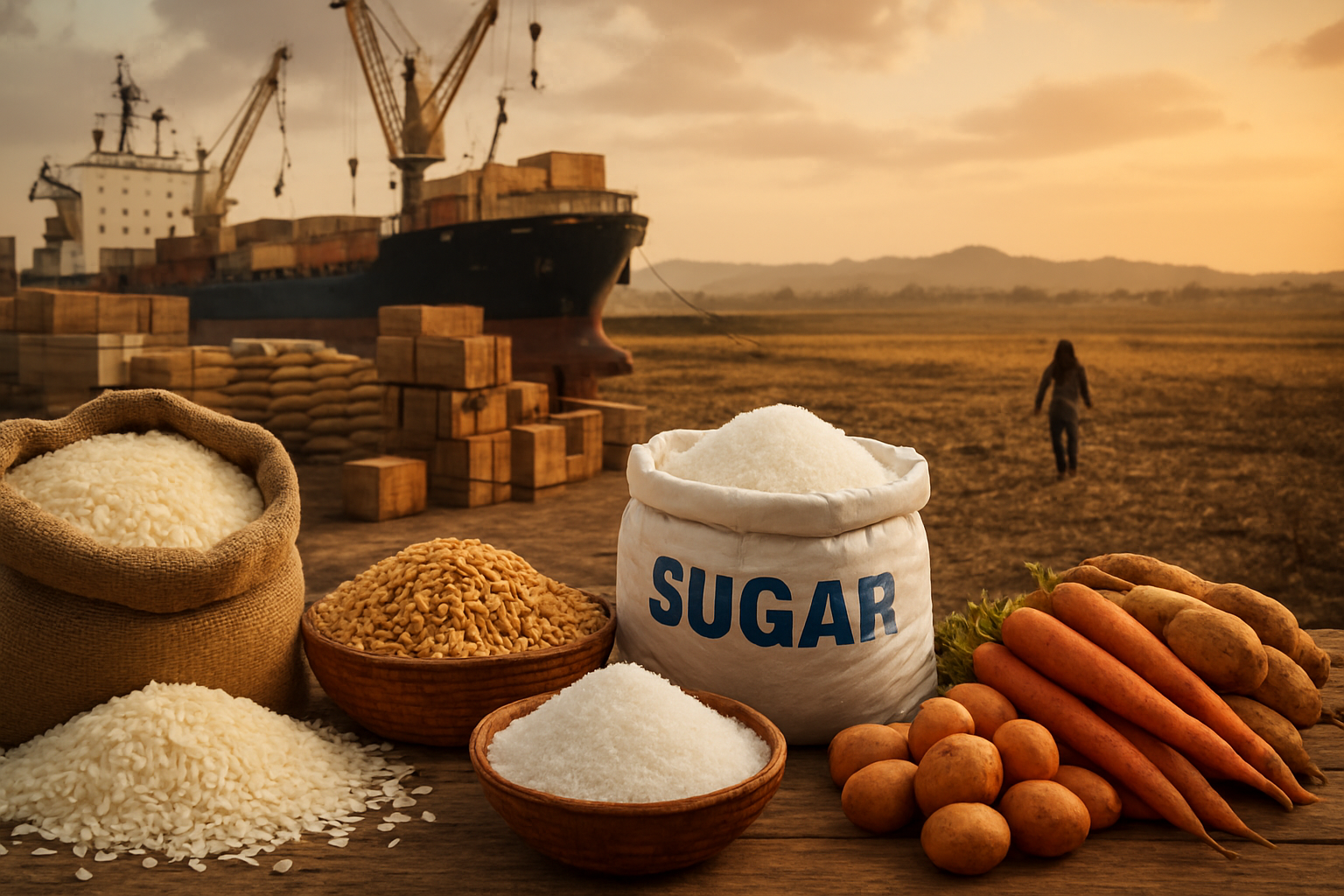
Africa stands at a critical juncture, facing an escalating food import bill that threatens its economic stability and food security. With its population booming and dietary patterns shifting, the continent's reliance on external food sources, particularly for staples like rice and sugar, is reaching unprecedented levels. This dependency, projected to push Africa's food import expenditure to an astounding US$110 billion by 2025, underscores a profound challenge: how to feed a rapidly growing populace when domestic agricultural production consistently falls short.
This deepening reliance on imports exposes African economies to volatile global markets, drains precious foreign exchange reserves, and stifles local agricultural growth. The implications are far-reaching, affecting everything from national budgets and inflation rates to the livelihoods of smallholder farmers and the nutritional well-being of millions. As global supply chains remain susceptible to disruptions and geopolitical tensions, Africa's food import dilemma demands urgent and strategic interventions to foster self-sufficiency and build resilient food systems.
The Widening Gap: Details of Africa's Import Dependence
Africa's burgeoning food demand is creating a significant chasm between consumption and local production, making it the most food-import-dependent region globally. The continent's annual food import expenditure, already around US$50 billion, is on a trajectory to potentially double in the coming years. This reliance is particularly pronounced in the rice and sugar markets, which are pivotal to the dietary habits and economies of many African nations.
In the rice market, consumption reached 58 million tons in 2024 and is expected to climb to 66 million tons by 2035. Despite efforts to boost local output, domestic production, at 41 million tons in 2024, is insufficient, necessitating imports of 17 million tons in the same year—a 2.4% increase from the previous year. Sub-Saharan Africa alone is set to import 18.6 million tonnes of rice in the 2024/25 season, solidifying its position as the world's largest rice importing region. Countries like Cote d'Ivoire, Benin, and South Africa are major importers, with semi-milled rice accounting for the largest share. The consistent growth in import volumes, averaging +1.9% annually from 2013 to 2024, highlights a sustained and increasing deficit in local supply.
Similarly, the African sugar market is experiencing robust growth, with consumption hitting 24 million tons, valued at $14.4 billion, in 2024. Projections indicate a rise to 26 million tons by 2035. However, domestic sugar production, at 12 million tons in 2024, covers only half of the demand, leading to imports of 15 million tons, valued at $10.1 billion, in 2024. Algeria, Morocco, and Sudan are identified as key importers, while Egypt, Sudan, and South Africa lead in consumption. This heavy reliance on external sources for such fundamental commodities underscores a systemic challenge in developing robust and competitive agricultural sectors across the continent. The timeline of events leading up to this moment shows a consistent trend of population growth outstripping agricultural productivity gains, exacerbated by underinvestment and climate vulnerabilities.
Market Movers: Companies Navigating Africa's Food Import Landscape
The dynamics of Africa's expanding food demand and import reliance create distinct winners and losers among public companies, primarily impacting agricultural commodity traders, food processors, logistics firms, and input suppliers.
Winning Companies: Global agricultural commodity trading houses such as Archer-Daniels-Midland (NYSE: ADM), Bunge Global SA (NYSE: BG), and Cargill (Private) stand to benefit significantly. As Africa's import volumes for rice and sugar surge, these companies, with their vast global networks for sourcing, shipping, and distribution, are well-positioned to meet the growing demand. Their ability to manage complex supply chains, navigate international trade regulations, and absorb market volatility makes them indispensable partners for African nations seeking to secure food supplies. Similarly, international shipping and logistics companies like AP Moller - Maersk (CPH: MAERSK-B) and Mediterranean Shipping Company (Private) will see increased demand for their services as more food commodities are transported to the continent.
Companies that specialize in processing imported raw materials into consumer-ready products within Africa could also thrive. For example, large-scale milling operations for rice or sugar refineries that process raw sugar imports could see increased throughput. Furthermore, companies providing agricultural inputs, like improved seeds and fertilizers, to African farmers could also see increased demand, although this is contingent on efforts to boost local production rather than solely relying on imports.
Losing Companies/Sectors: Local African agricultural producers, particularly smallholder farmers, are often the primary losers. The influx of often cheaper imported rice and sugar can undercut domestic prices, making it difficult for local farmers to compete. This can lead to reduced profitability, disincentivizing investment in local agriculture and potentially pushing farmers out of business. African food processing companies that rely heavily on locally sourced raw materials may also struggle if local production declines or becomes less competitive due. Additionally, any African companies involved in domestic agricultural input supply chains that cannot compete with subsidized or more efficient international suppliers might face challenges. The long-term effect is a weakening of the domestic agricultural base, making the continent even more vulnerable to external shocks.
Wider Significance: Broader Trends and Policy Implications
Africa's escalating food import dependence is not an isolated issue but a symptom of broader, interconnected trends with significant implications for global food security, economic development, and international relations. This phenomenon fits into a wider narrative of rapid urbanization, population growth, and changing dietary preferences across the continent, coupled with persistent challenges in agricultural productivity and infrastructure.
The event highlights a critical failure in achieving food self-sufficiency, despite Africa possessing vast arable land and significant agricultural potential. It underscores the ongoing struggle against low agricultural productivity, chronic underinvestment in rural infrastructure and research, limited access to modern inputs and finance for smallholder farmers, and the devastating impact of climate change. The continent's vulnerability to erratic weather patterns, droughts, and floods, now occurring with alarming frequency, severely hampers domestic production. Furthermore, significant post-harvest losses, sometimes up to 40% of crops, exacerbate the supply deficit.
From a policy perspective, this reliance necessitates a re-evaluation of agricultural strategies across African nations. There is a pressing need for policies that promote sustainable intensification of agriculture, improve market access for smallholder farmers, attract investment in agricultural value chains, and enhance resilience to climate shocks. Regulatory frameworks might need to be adjusted to balance the need for affordable food imports with the imperative to protect and stimulate domestic production. Historical precedents, such as the food crises of the past two decades driven by global price spikes, serve as stark reminders of the dangers of excessive import reliance and the urgent need for robust domestic food systems. The current situation echoes concerns raised during the 2007-2008 food price crisis, where many African nations faced severe social and economic instability due to their dependence on imported staples.
What Comes Next: Navigating Future Scenarios
The trajectory of Africa's food import reliance presents a range of short-term and long-term possibilities, demanding strategic pivots and adaptive measures from governments, businesses, and international organizations. In the short term, the continent will likely continue to lean heavily on imports to meet immediate food demands, particularly for rice and sugar, as domestic production capacity cannot be transformed overnight. This necessitates maintaining stable trade relationships with key exporting nations and potentially exploring diversified sourcing strategies to mitigate risks associated with over-reliance on a few suppliers. Governments may also need to implement social safety nets to cushion vulnerable populations from the impact of volatile international food prices.
Looking further ahead, the long-term imperative is to drastically reduce import dependence by fostering robust and resilient domestic food systems. This will require significant, sustained investment in agricultural research and development, improved irrigation infrastructure, access to quality seeds and fertilizers, and enhanced extension services for farmers. Strategic pivots could include focusing on crops best suited to local agro-ecological zones, promoting climate-smart agriculture practices, and developing value-added processing industries to reduce post-harvest losses and create local employment. Market opportunities will emerge for companies specializing in agricultural technology, sustainable farming solutions, and localized food processing. Challenges will include securing adequate financing, overcoming bureaucratic hurdles, and addressing land tenure issues. Potential scenarios range from a continued, unsustainable increase in import bills if current trends persist, leading to heightened economic instability, to a more optimistic future where strategic investments and policy reforms gradually enable greater food self-sufficiency, driven by empowered local producers and diversified agricultural economies.
A Continent's Culinary Conundrum: The Path Forward
Africa's expanding food demand and its profound reliance on imports, particularly in the rice and sugar markets, represent one of the most pressing economic and humanitarian challenges facing the continent today. The escalating food import bill, projected to reach US$110 billion by 2025, is a clear indicator of a systemic imbalance between consumption needs and domestic production capabilities. This reliance not only drains foreign exchange reserves and exacerbates fiscal strains but also exposes millions to the volatility of global commodity markets and stifles the growth of local agricultural sectors.
Moving forward, a multifaceted approach is essential. Key takeaways from this analysis underscore the urgent need for increased investment in African agriculture, focusing on enhancing productivity, improving infrastructure, and building resilience to climate change. Policy reforms must prioritize supporting smallholder farmers, facilitating access to finance and modern inputs, and creating a conducive environment for agricultural processing and value addition. For investors, the coming months will offer opportunities in companies that can provide sustainable agricultural solutions, improve logistics and supply chain efficiencies within Africa, or contribute to local food processing capabilities. Conversely, companies heavily reliant on the status quo of extensive food imports without a strategy for local engagement might face increasing scrutiny and potential risks.
The lasting impact of this challenge will depend on the collective will of African governments, international partners, and the private sector to transform the continent's agricultural landscape. The goal must be to transition from a cycle of import dependence to one of sustainable food security, where Africa not performs a dual role of feeding its own population and also emerges as a significant player in global food production. Investors should closely watch policy developments, agricultural investment trends, and the performance of key agricultural and food-related companies across the continent, as these will be critical indicators of progress toward a more food-secure future.
This content is intended for informational purposes only and is not financial advice






